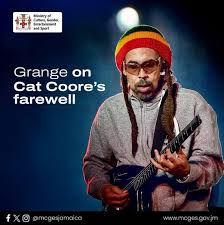Political Symbolism vs. Real Leadership in Jamaica’s Hurricane Recovery
- Yaawd Media

- Nov 4, 2025
- 3 min read
By Richard Hugh Blackford; Fine Artist, Author, and Social Commentator

The news that Jamaica’s two retired Prime Ministers PJ Patterson, now 90, and Bruce Golding, 77, have been invited to join the island’s hurricane recovery effort has been widely framed as a moment of national unity. On the surface, it’s an image designed to inspire: two elder statesmen, one from the PNP and the other from the JLP, coming together for the greater good.
But beyond the optics lies a harder truth. Both men, though respected for their service, have no actual role in the governance or management of Jamaica today. They hold no executive authority, no budgetary control, and no administrative reach. Their inclusion, while symbolically comforting, is effectively ceremonial—an attempt to project political harmony where, in reality, there is none.
Meanwhile, the country continues to grapple with the fallout from Hurricane Melissa, which has entered its second week with rising death tolls, hunger, and widespread destitution across affected areas. Yet, there has been no visible display of cohesive leadership at the national level. Instead, Jamaicans are witnessing a very public cold war between the current Prime Minister, Andrew Holness (JLP), and the Opposition Leader, Mark Golding (PNP)—two men whose mutual disdain appears to override any shared sense of urgency.
In the absence of real collaboration, the Opposition has launched its own independent recovery initiative; commendable in intent but clearly constrained by the lack of access to critical government resources and coordination mechanisms. This duplication of effort not only weakens efficiency but also underscores the widening disconnect between politics and people.
And while this political theatre continues, Local Government Minister Desmond McKenzie, now 72, has mounted a defensive posture against critics, insisting that the Government is “doing its best.” What he seems oblivious to, however, is the human cost behind that statement. At least 38 people have already perished, and that number will undoubtedly rise as the search for the missing continues.
Those familiar with disaster response know that the first 48 hours after a storm are the most critical—
reserved for search and rescue. After that comes recovery—which too often, in our context, means the grim task of collecting bodies. Yet, instead of leading coordinated rescue efforts, the Government’s principal output has been a series of press conferences, statements, and photo opportunities—activity without action, sound without substance.
In a moment demanding competence and compassion, the administration has offered neither. What Jamaica needs now is not another televised briefing but a visible, functional disaster management command, properly resourced and empowered to restore order, provide relief, and give the people a reason to hope.
A Call to Reclaim Purpose and Humanity
Jamaica stands at a crossroads—not just in the wake of a natural disaster, but at a moral and political one. Hurricane Melissa has stripped away not only roofs and roads but the illusion that leadership can survive on public relations alone. It has laid bare the weakness in our institutions, the absence of empathy in governance, and the peril of politics without purpose.
Yet, within the wreckage lies an opportunity: to rebuild not just structures, but standards. To return to a form of leadership that listens before it speaks, that acts before it advertises, and that understands that every Jamaican life is worth more than any party line.
If there is to be any true legacy from this tragedy, it must be that Jamaica rediscovers its capacity to care—to put people before politics and humanity above headlines. The world is watching, but more importantly, Jamaicans are watching. What we do next will define who we are long after the waters recede and the cameras move on.
Epilogue
You should judge a society by the way it treats its old and infirm, its young, and its dead. By that measure, Jamaica still has much to prove.
Author’s Note: Richard Hugh Blackford is a Jamaican fine artist, published author, and social and political commentator based in Fort Lauderdale, Florida. His work explores the intersections of culture, identity, and justice within the Caribbean experience.



Comments